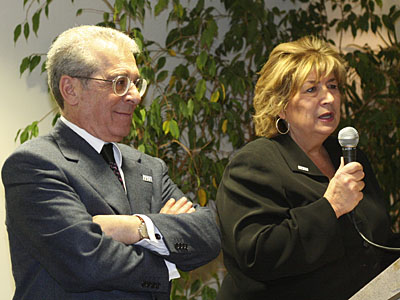|
![[UNESCO IOC]](/crs/globaloceans3/pix/unesco-ioc.jpg)
![[UD CMP]](/crs/globaloceans3/pix/cmp.jpg)
![[UNEP]](/crs/globaloceans3/pix/unep.jpg)
![[NOAA IPO]](/crs/globaloceans3/pix/noaa.jpg)
![[UNEP GPA]](/crs/globaloceans3/pix/gpa.jpg)
![[GEF]](/crs/globaloceans3/pix/gef.jpg)
![[World Bank]](/crs/globaloceans3/pix/wob.jpg)
![[DFO Canada]](/crs/globaloceans3/pix/canada.jpg)
![[Portugal]](/crs/globaloceans3/pix/portugal.jpg)
![[World Ocean Network]](/crs/globaloceans3/pix/won.jpg)
|
Third Global Conference on
Oceans, Coasts and Islands
Moving the Global Oceans Agenda Forward
UNESCO, Paris | January 24-27, 2006
Italy Urges Biodiversity at Oceans Conference

On Thursday, participants in the Third Global Conference on Oceans,
Coasts and Islands heard panel presentations and engaged in discussion
on developing capacity for oceans and coastal management, regional
dialogue and cooperation in the Mediterranean, improving high seas
governnance, and the relationship between oceans and climate.
Jeffrey Sachs, Director of the UN
Millennium Project, made a special presentation on the challenges
developing countries face in protecting their natural environments.
In the late afternoon, participants engaged in concurrent dialogue
sessions on the connection between freshwater and oceans, next steps
in Small Island Developing States (SIDS), tsunami and disaster
preparedness, next steps in capacity development, bioprospecting
in the high seas, and oceans and climate.
In the evening, Italy's Ministry for the Environment and Territory
held a reception for conference participants, marking its endorsement
of the "Countdown 2010" intiative to stop the loss of biodiversity in
Europe by 2010. Above: after announcing Italy's support for
"Countdown 2010" and challenging other nations to join in supporting
the initiative, Aldo Cosentino, Director-General, Nature Protection,
Italy, listens as Biliana Cicin-Sain, Co-Chair and Head of the
Secretariat, Global Forum on Oceans, Coasts and Islands, addresses
participants at the reception.
|
|
Thursday, 26 January
|
|
Panel 8: Capacity Development for Oceans and Coastal Management:
Mobilizing to Address Needs
|

|

Introducing the session, Co-Chair Indumathie Hewawasam, World Bank,
reported from the Capacity Development Task Force, and urged
implementation of the Task Force's recommendations.
|

Co-Chair Ralph Cantral, Chief, National Policy and Evaluation Division,
Office of Ocean and Coastal Resource Management, National Ocean Service,
US NOAA, explained that the panel would respond to questions and
comments from the floor.
|

Co-Chair Thia-Eng Chua, Regional Programme Director, PEMSEA, called on
donors and multilateral lending agencies to engage with countries whose
"democratic space" has newly opened up.
|

Robin Mahon, Caribbean LME Programme, argued that indigenous academic
institutions in SIDS should encourage their students to remain in-country
to contribute to domestic development.
|

Mary Power, South Pacific Applied Geoscience Commission, suggested that
professionals who have emigrated make a positive contribution by
exerting influence in international fora.
|

James Hardcastle, Technical Advisor for Island Conservation, Nature
Seychelles, underlined the need to engage with community members that
have the power to persuade others.
|
|
Panel 9: Regional Dialogue and Cooperation: The Mediterranean Case
|

|

Paul Mifsud, Coordinator, Mediterranean Action Plan (MAP), UNEP Regional
Seas Programme, described the Protocols under the Barcelona Convention.
He said the Protocol on pollution from land-based activities has led to
the development of a strategic action programme and national action
plans, complemented by a large-scale capacity-building programme.
|

Marie-Christine Van Klaveren, Executive Secretary, Agreement on the
Conservation of Cetaceans of the Black and Mediterranean Seas and
Contiguous Atlantic Area (ACCOBAMS), highlighted its legally
binding action plan, which tackles pollution, noise, loss of habitat,
and fishing activities, including by-catch.
|

Zoran Šikić, Assistant Minister of Culture, Republic of
Croatia, described the national legal regime for the conservation and
sustainable use of the Croatian coastal and marine environment,
highlighting the creation of protected coastal zones, special marine
reserves, national parks and an Adriatic MPAs network.
|

Ivica Trumbic, Director, Regional Activity Centre for Priority Actions
Programme (PAP/RAC), MAP, noted the political, cultural, environmental
and social complexity of the Mediterranean and identified unsustainable
exploitation of its resources as a key issue in the region.
|

Gennaro Longo, Chief, Earth, Environmental and Marine Sciences and
Technology, International Center for Science and High Technology, UN
Industrial Development Organization, described the Center's
activities, highlighting it aims to strengthen and promote sustainable
use of coastal and marine resources through the development of
supporting tools for integrated coastal management.
|

Sami Marrouki, Executive Director, Mediterranean Renewable Energy Centre
(MEDREC), stated that the Mediterranean Renewable Energy Programme
provides sustainable energy services, particularly to rural populations,
to contribute to climate change mitigation by increasing the share of
renewable energy in the energy mix of the Mediterranean basin.
|
|
Panel 10: Improving High Seas Governance
|

|

Stressing the importance of UNCLOS, Co-Chair Ascencio Herrera stated
that the Convention does not define marine scientific research, and
there is also no internationally agreed definition of bioprospecting of
the international seabed area. He called for further studies and
underlined the need to address, coherently and harmoniously, all issues
relating to marine biodiversity beyond national jurisdiction within the
UNCLOS framework. He argued that the UN General Assembly is the
appropriate forum for debating these issues as it plays a key role in
promoting cooperation and coordination and in ensuring integrated
approaches.
|

Tullio Scovazzi, Bicocca University of Milan, Italy, pointed out that
marine scientific research is not defined but regulated by UNCLOS,
whilst bioprospecting is not specifically mentioned in the Convention.
He said this lacuna must be tackled by a new agreement on MPAs.
|

Alex Rogers, Biological Sciences Division, British Antarctic Survey,
elaborated on deep sea biodiversity and fishing activities. Stressing
that the deep seabed houses a startling biodiversity, much of which is
still unknown, he described its unique ecosystems, including seamounts,
coral reefs and hydrothermal vents.
|

Co-Chair Salvatore Arico, Programme Specialist, Biodiversity, Division
of Ecological Sciences, UNESCO, presented a paper by Abdul Zakri, UN
University-Institute for Advanced Studies, on trends in deep seabed
research, which he said is going on at an increasing pace. He noted a
shift in the focus of deep seabed expeditions from geophysical and
geological purposes to ecological, biological and bioprospecting ones.
|

Vladimir Golitsyn, Director, UNDOALOS, called for further targeted
marine biodiversity research, which he identified as highly
sophisticated, costly and labor intensive. He recognized the need for
better cooperation between governments, institutions, scientists and
industry engaged in marine biodiversity research in order to share costs
and information, increase geographical cover and ensure the
participation of developing countries.
|

Norma Taylor-Roberts, Deputy Permanent Representative to the United
Nations, Jamaica, expressed concern over the lack of a legal regime to
regulate bioprospecting. Calling for a wider acceptance and
implementation of UNCLOS, she advocated concluding a new agreement under
UNCLOS to address bioprospecting, rather than developing a new
convention.
|
|
Special Presentation
|

|
Addressing the conference via a live video connection from Africa,
Jeffrey Sachs, Director, Earth Institute at Columbia University,
Director of the UN Millennium Project and Special Advisor to the UN
Secretary-General on the MDGs, argued that despite the plethora of
statements, goals and laws aimed at poverty reduction and environmental
protection, there is little follow through on work programmes. He said
developing countries are unable to protect their natural environments
because: they cannot afford to increase their environmental capital;
vested interests strip countries of their resources without distribution
of profits; the global economic paradigm is forcing countries to adopt
unsustainable economic models; and they lack the scientific knowledge
with which to determine the best course of action.
During the subsequent discussion, Sachs addressed the importance of
including the environment in countries' PRSPs, ensuring that
information relating to the environment is disclosed and projecting
scientific consensus concerning the state of the oceans. He affirmed
his belief in the strength of the tools available to policymakers to
spur action on the ground.
|
|
Panel 11: Oceans and Climate
|

|

Panel Chair Robert Corell, Chair, Artic Climate Impact Assessment, gave
an overview of the recent scientific findings on climate effects on
oceans, stressing that since the oceans contain 97% of the Earth's
water, they are the thermodynamic engine of the planet. He listed
current and projected effects of climate change on oceans, including sea
level rise, biodiversity loss, the disappearance of Greenland's
icecap, and thinning of the Arctic sea ice.
|

Noting accelerating climate variability, Ambassador Gunnar Palsson,
Ministry of Foreign Affairs, Iceland, said the availability of reliable
scientific data is crucial, and called for increased resources for
research on the risks and benefits of the impact of climate change on
oceans, and improved integration of scientific data into the public
domain.
|

Halldor Thorgeirsson, Deputy Executive Secretary, UN Framework
Convention on Climate Change (UNFCCC), explained that the Kyoto Protocol
allows for use of market tools to mitigate climate change and that the
last UNFCCC COP has set the base for the development of a future
strategy.
|

Ambassador Enele Sopoaga, Tuvalu, Vice Chair, Alliance of Small Island
States, underscored the impact of climate change on SIDS, as illustrated
by the recent increases in the frequency and intensity of hurricanes in
the South Pacific. He argued that SIDS cannot begin to develop
sustainably until climate change is comprehensively addressed, and urged
developed nations to intensify their mitigation strategies and support
SIDS's efforts to implement adaptation strategies.
|

Highlighting climate change-related sea level rise and acidification,
John Shepherd, Tyndall Centre Regional Associate Director, Southampton
Oceanography Centre, stated that any adaptation strategy must be:
concentrated on reducing physical and social infrastructure in coastal
areas; planned regionally whilst being focused locally; supported by
government institutions; and long-term.
|

Ellina Levina, Climate Change Analyst, Environment Directorate,
Organization for Economic Cooperation and Development, presented on
integrating scientific knowledge into policymaking. She called for:
appropriate strategies and institutional and legal frameworks to allow
for the development of a science-based policy framework; mechanisms that
identify key players and information; clear communication of scientific
data to policy makers and local stakeholders; and additional research.
|
|
Concurrent Dialogue Sessions on Achieving Synergy
|

Dialogue session on high seas governance: bioprospecting in the deep
seabed.
|

Dialogue session on next steps in SIDS.
|

Dialogue session on tsunami and disaster preparedness.
|

Dialogue session on freshwater to oceans.
|

Dialogue session on next steps in capacity development.
|

Dialogue session on oceans and climate.
|
|
Evening Reception by the Ministry of Environment and Territory, Italy
|

Participants were welcomed to the reception by Aldo Cosentino, Italy's
Director-General, Nature Protection, and Ezio Bussoletti, Scientific
Advisor, Permanent Delegation of Italy to UNESCO.
|

Participants enjoyed a wide variety of hors d'oeuvres...
|

...and wines from Italy's Berlucchi family.
|

|

|

|
|